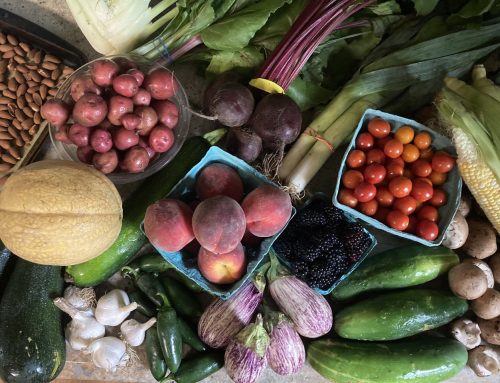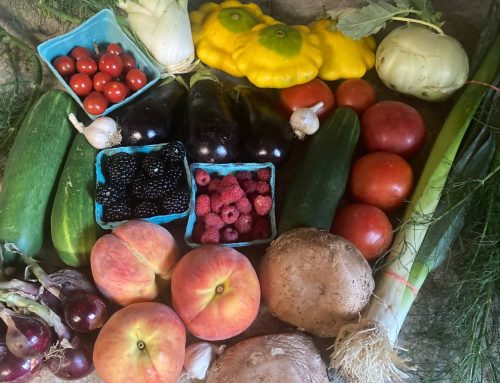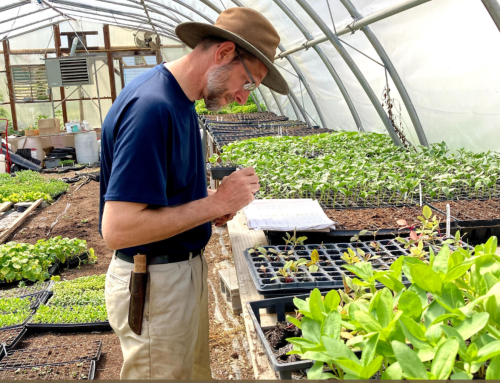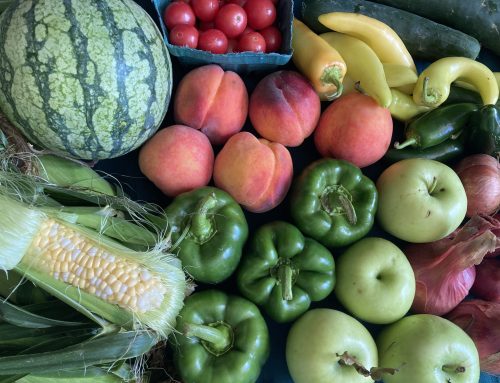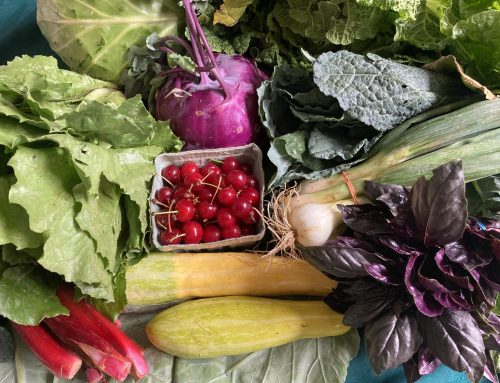I want to eat healthier.
I want to eat more vegetables.
I want to eat organically.
I want to know my farmer.
I want to know where my food comes from.
I want to support a local farm somehow instead of corporate-owned stores and big agriculture.
But where should I start?
Genuine desires like these could become your goals but LIFE always seems to get in the way.
Perhaps you are the mom who shuttles her kids to activities, works odd hours and comes home to “controlled” chaos, an empty fridge, and no meal ideas. Everyone is hungry and you are “hangry.”
Maybe you are homebound, battling pain and fatigue, just trying to hold it together. Going out to shop is a monumental chore and thinking about healing with food is too complex to get through the brain fog.
Are you a working or retired adult who finally has time to focus on being healthy so you can be a part of life with your grandkids or enjoy your empty nest? What changes do you want to make?
Maybe you are a busy working single or couple that needs more convenient options in your life so you can make the most of your off time. Food delivery services are appealing but you’re not sure if the quality is worth the price. Does everything really come from local farms as they claim?
Getting real food you can trust and enjoy shouldn’t be such a challenge.
You know there are lots of ways to buy your food and the options are becoming more convenient all the time. From local and organic produce at your grocery store to health food stores, farmer’s markets, meal kit deliveries, Amazon Prime & Whole Foods, and local online buying clubs, the choices can be overwhelming to sort through.
We want you to know that local farms are changing with the times and it can be just as easy to get food you trust from a farmer you know.
I talk to people who come to our farm for many reasons, looking for solutions. They are often looking for answers to these problems as well.
Seeking answers often leads you to more questions than when you started.
- Do posts and articles about our broken food system cause you to get discouraged and wonder what you can do differently?
- Do you sense that you are wasting time and money at the grocery store purchasing vegetables you are not sure are up to your standards?
- Is it a hassle to go to farmer’s markets or tiny health food stores to obtain the fresh veggies?
- Do you wonder if meal kits and ugly vegetable boxes are gimmicks that short cut your local farmer?
- Do health concerns have you searching for local, organically grown vegetables and other real foods?
Two friends who experienced all these questions and challenges allowed me to share their stories.
Mary’s Story: more confused than ever
Mary made a resolution this year to eat better, cleaner food. She read articles about organic food and saw that her favorite grocery store was making an effort to supply fruit and vegetables from local farmers. She started making the change to organic but noticed that most of the organic produce was coming from California and Mexico, sometimes even from China. “What kind of organic standards does China follow?!” she wondered.
Next, she looked at the local produce on the display but noticed two things: very little of it was organic and the towns listed for the farms’ addresses were in her state, but not nearby. Was she really supporting local farmers who were using good practices on their land? She made her purchases for the week with lingering questions and a small pit of frustration in her stomach.
Over the next couple of weeks, Mary made the effort to get to the small health food store in her area and the farmer’s market in the next town over.
Even though she liked both, Mary just didn’t get there very often in later weeks so she ended up at her grocer more often than she liked. How to solve this? Maybe she’d look online for one of those organic delivery services.
Once again, the choices for food deliveries mystified her. She tried a few but the cost added up, sometimes the quality wasn’t great: the produce didn’t keep long and she had a feeling that most of it wasn’t really local anyway. She did love saving the trip to the store and knowing that food was on the way but the questions didn’t go away. How could she be sure what organic practices were being followed? Worst of all, every box came with so much throw away packaging.
With all her questions unresolved and her commitment waning, Mary noticed that the health benefits she was hoping for were elusive and the added confusion and stress was not helping.
Katie’s Story: problem solved
My friend, Katie, was driving through rush hour traffic with two whining, tired kids while she was thinking through the rest of the evening. The kids had to hang up their suits after swim practice and get out their homework. Her husband would be home in about an hour. She knew the kids would get a second wind and want to play with toys as soon as they had some food in their bellies.
Food! Her mind jolted. She didn’t have supper planned today because she was in such a rush this morning. Her mind raced as she pulled into the driveway. Should she turn around and head to the store for some ingredients for a meal?
Then her headlights fixed a spotlight on the green and white produce box sitting in the shady spot next to the garage.
Ah! What a relief! Her weekly veggie box from her farmer was sitting there waiting to be brought in. Her refrigerator would be well-stocked with food fresh from the farm in just a few minutes.
She knew she could make a fresh, quick meal from the bread, cheese and salad ingredients that she would find in her box. Even her husband would appreciate the delicious, simple meal that was coming together in her head as she headed into the house.
As the family sat down to eat grilled cheese sandwiches (actually, gouda on country sunflower sourdough) and fresh lettuce and arugula salad with the first cucumbers of the season, Katie realized how much flavor she’s missed out on in all these years of grocery store produce from California and beyond.
At last, she had peace of mind that the food she was eating was nutritious and not full of chemicals.
Katie was even looking forward to visiting the farm with the family on Saturday for their Open Farm event.
“It’s good to know where your food comes from,” she thought.
You need a farmer you can trust to grow your food for you.
Farmers have the option to grow and sell their food in many different ways. One of the most satisfying ways is to create and sell through their own farm share CSA.
CSA stands for “Community Supported Agriculture” which means it is a relationship between the farmer and his members to produce quality products for those who have committed to buying them for a whole season. You’ll learn more about this relationship as you read on.
Do you want to know where your food comes from? Do you want to know your farmer?
In today’s world with GMOs, factory farming, and heavy chemical use on conventional farms, more and more people are trying to figure out how they can avoid the known and unknown risks and consequences of those factors. It makes you wonder who and what you can trust.
That’s the reason the phrase “Know your farmer, know your food” was coined. When you join a farm, you will get to know the farmer personally. You will have the opportunity to visit, see the fields and talk to the farmer about growing practices. The farm might even send weekly emails or post short videos that will help you see the inside workings of the farm.
Committing to a farm is a special relationship for both you and the farmer. Local farmers love knowing who they are growing for and sharing the story of their food with you. You get to see behind the scenes of what goes in your Farm Share box and support your farmer through the ups and downs of each season. You’ll have the joy of knowing that you are supporting the livelihood of a real family on a small farm so that he can keep doing this year after year.
Do you want to eat fresh, great-tasting, in-season vegetables from a local farm?
If you’ve ever tasted a home-grown tomato, you know that a grocery store tomato just doesn’t cut it. As a farm share CSA member, you’ll learn the same thing about ALL the vegetables. Carrots, potatoes, onions, kale, watermelon, just taste so much better when they are fresh-picked at the peak of ripeness.
Committing to eating a season of vegetables from a farm share CSA will educate your taste buds. You will realize what you’ve been missing, and how the grocery store vegetables (even locally grown) pale in comparison. Your meals will taste better because you will use high-quality, nutritious ingredients. You don’t have to be a gourmet cook to have amazing meals. Simple meals with farm fresh herbs and veggies might transform your day, maybe even your health.
But because you are joining a local farm, you can’t get tomatoes or peppers in June, or watermelon in October. If that’s what you want from a farm share CSA, you’ll be disappointed. If you are willing to eat the best veggies when they are ready, then you will do great as a member of a farm.
Do you want to eat more vegetables? Are you willing to try new foods?
Are you used to eating only lettuce, carrots, beans, corn, and potatoes? The farm share CSA will fill your table with your favorite vegetables and more!
With a little commitment to adventure, and a willingness to expand your eating habits, you’ll find new favorite vegetables and even learn to like ones that you never did before.
Nancy, a 10-year farm share CSA member, had this experience:
“We’ve been members of the CSA for many years now and have had a great experience. Thanks to the CSA we’ve been introduced to new types of veggies that we probably never would have thought of trying before, like swiss chard and arugula. We’ve also enjoyed being able to get ones that we already knew we liked such as butternut squash and kale, knowing that they are fresh and organically grown.”
A traditional CSA gives you little choice about what goes in your box each week. The farmer plans and grows what works the best on his farm and what he thinks most of his members will want.
A few farms are offering customizable farm share CSA boxes. Your box will be packed according to your eating preferences. If you love arugula, you can make sure you get it every time it is offered. On the other hand, if you already know you don’t ever want to get a certain vegetable, you won’t. Of course, you are encouraged to try everything at least once, especially if a recipe is provided for it. You may find you like it prepared a new way.
With a commitment to a whole season of great-tasting, farm-grown vegetables, you’ll have the opportunity to eat a wide variety, learn to eat new ones, and find creative ways to cook your favorites.
Do you like to eat good food? Do you like to cook?
I touched on this topic in the previous question but it is really important. A farm share box is full of vegetables that have to be eaten to be enjoyed. Many can be eaten raw but some just have to be cooked (or juiced, or used in smoothies).
Successful farm share CSA members cook several times a week and enjoy the challenge of creating meals and finding recipes to use the items in their box. The end result is worth it – home-cooked meals that taste better than a restaurant!
No one likes to see their farm share veggies go to waste because they don’t know what to do with them. And to be honest, that is one reason why some folks don’t renew their farm share CSA membership. Some waste will happen, especially in the beginning as you learn how to use your box. This is normal.
But don’t worry, as long as you are willing to cook, many farmers will help you by sending you recipes, tutorials, and suggestions for using everything in your box. Your experience will be even better when you get to customize your box each week. It’s easy to use and eat vegetables that you already know you like.
Do you like to plan your menus? Do you appreciate creativity and flexibility in the kitchen?
The most successful farm share CSA members learn to be flexible in order to enjoy the benefits of eating this way. You just can’t plan your menu around the same seven meals each week and expect to get the same ingredients from your box. Every week will be different. Some will find the spontaneity refreshing and others will be challenged by it.
You don’t have to be a strict menu planner to be successful with a farm share CSA. Menu planning certainly helps many members but a loose plan is very successful for others.
Most farmers will give you a few days notice to let you know what is coming in your box. If you can customize your box with your farm, you’ll be able to make adjustments according to your tastes and even your menu ideas. Doubling up on your favorites and purchasing extras from some farms might be an option that will make you even more successful.
Creativity in the kitchen and a certain amount of flexibility are great characteristics of farm share CSA members. You might be excited by this or you might be willing to learn and grow to master these skills as you experience the changing harvests. If so, then a farm share CSA is a good choice for you.
When you know your farmer, you know your food.
The vegetables you get from a farm have added value because they are telling a real story.
Not just the story of starting from organic seed, planted in healthy, fertile soil, carefully weeded and picked by your farmers, washed and packed by hand just for you.
Not just the story of the farmer and his family and how you help them live out their calling to the land.
It’s also YOUR story. Your journey with food. Your quest to eat more vegetables and be healthy. Your peace of mind. Your amazing meals, crafted in your kitchen, that you love to eat.
Begin your story by choosing a local farmer who is farming your way and making it easy to connect with his farm.
We are excited to announce that our 2020 farm share registration at Willow Haven Farm is open!
If you are interested in taking the next step, we are offering 50% off your first delivery to new members.
Click the button below to claim your coupon code.
My Coupon Please
